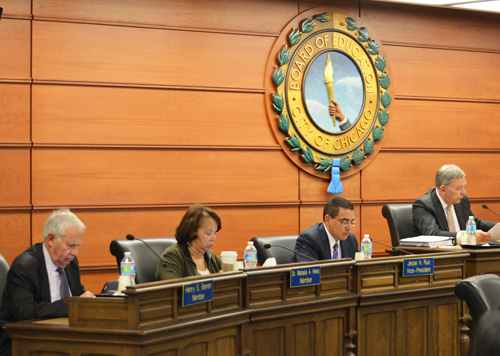November 19 Chicago Board of Education meeting first time in decade the Board meets in a community... Board's risky financial policies are not just around 'toxic swaps' but extend to escalating debt and gimmicks for repaying debt...
Quiz Time. Question: When was the last time the Chicago Board of Education, which runs the nation's third largest public school system, met at a location and at a time when most working people -- including students, parents and teachers, could go to the meeting without taking off from work and spending an enormous amount of money to park in downtown Chicago? Answer: It wasn't in this decade, and it was so long ago that half the children currently in the city's elementary schools were not born yet.
The November 19, 2014 meeting of the Chicago Board of Education will be the first time since Barack Obama was elected President of the United States that the Board will be meeting in a Chicago community, instead of in the expensive (for parking and transportation) downtown offices at 125 S. Clark St. The meeting, which is scheduled to begin at 4:30 p.m. instead of the usual "bankers hours" start (10:30 a.m.) will also make the Board more convenient to the community, parents, teachers, and students for the first time in a decade.
 Four of the seven members of the Chicago Board of Education during the Board's October 22, 2014 meeting. Left to right, Henry Bienen, Mahalia Hines, Jesse Ruiz, and Board President David Vitale. All of the current members of the Chicago Board of Education at appointed by Mayor Rahm Emanuel and have tended to rubber stamp Emanuel's policies. In November 2014, the Chicago Tribune ran a three-day expose about how Vitale's leadership (he previously served as the Board's first "Chief Administrative Officer" under Arne Duncan) had saddled the Board with variable rate bond debt that could cost the school system an extra $100 million in future years because of the undisclosed terms of the deals at the time (from 2003 through 2007) that they were agreed to with the major banks. Substance photo by George N. Schmidt.While the agenda for the November 19 meeting will not be available to the public until November 17, 2014 at around ten in the morning, under the Open Meetings Act, a lot of the damage to the public integrity of the seven members of the Board and the mayor (Rahm Emanuel) who appointed them has been escalating in recent months. In addition to the massive investigative exposure of the Board's mistakes in agreeing to variable rate bonds between 2003 and 2007, the Board has also begun a return to some of the most risky financial practices of the middle of the last century. At its October meeting, the Board voted to return to the use of so-called "tax anticipation warrants," a form of borrowing from the major banks that helped precipiate the financial crisis of 1979 that led to the establishment of the Chicago School Finance Authority in 1980 and a massive (more than $500 million) borrowing the put the school system into a unique financial hole from 1980 through 2010.
Four of the seven members of the Chicago Board of Education during the Board's October 22, 2014 meeting. Left to right, Henry Bienen, Mahalia Hines, Jesse Ruiz, and Board President David Vitale. All of the current members of the Chicago Board of Education at appointed by Mayor Rahm Emanuel and have tended to rubber stamp Emanuel's policies. In November 2014, the Chicago Tribune ran a three-day expose about how Vitale's leadership (he previously served as the Board's first "Chief Administrative Officer" under Arne Duncan) had saddled the Board with variable rate bond debt that could cost the school system an extra $100 million in future years because of the undisclosed terms of the deals at the time (from 2003 through 2007) that they were agreed to with the major banks. Substance photo by George N. Schmidt.While the agenda for the November 19 meeting will not be available to the public until November 17, 2014 at around ten in the morning, under the Open Meetings Act, a lot of the damage to the public integrity of the seven members of the Board and the mayor (Rahm Emanuel) who appointed them has been escalating in recent months. In addition to the massive investigative exposure of the Board's mistakes in agreeing to variable rate bonds between 2003 and 2007, the Board has also begun a return to some of the most risky financial practices of the middle of the last century. At its October meeting, the Board voted to return to the use of so-called "tax anticipation warrants," a form of borrowing from the major banks that helped precipiate the financial crisis of 1979 that led to the establishment of the Chicago School Finance Authority in 1980 and a massive (more than $500 million) borrowing the put the school system into a unique financial hole from 1980 through 2010.
On top of what critics have called the "toxic swaps" (which the Board as of November 13 was still refusing to challenge in arbitration), the return to the use of tax anticipation warrants was joined by a completely new form of debt -- bonds for "performance" in pre-kindergarten. Even some usually loyal Board members have expressed misgivings about the novel bonds, which have never been used in any other school district in the USA.

